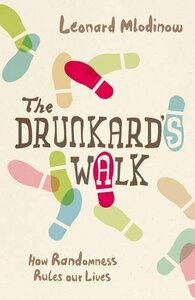You need to sign in or sign up before continuing.
Take a photo of a barcode or cover
challenging
informative
mysterious
medium-paced
The history of mathematics in this book was decidedly written by a mathematician, but nonetheless his reflections on how we interpret randomness in day to day life are extremely helpful and interesting. An anecdotal and entertaining read.
adventurous
challenging
funny
informative
slow-paced
informative
medium-paced
funny
hopeful
informative
inspiring
lighthearted
fast-paced
Randomness rules our lives, but not many outside the realm of mathematics and computer science discern it. Most of us meticulously plan everything from grocery shopping to travel itineraries without realizing this isn't necessarily an optimal thing to do. This book explains, with a variety of vivid examples, how randomness affects our lives. It does this by examining the maths behind randomness in an easy and conversational manner. It makes us realize that an understanding of probabiltiy and statistics can help us overcome our cognitive biases. My main takeaway from this book is that successful people are lucky, but to be lucky one has to be successful one has to be unrelenting and flexible
There are other books like Nicolas Taleb"s fooled by randomness that handles the topic more amusingly. Yet, I believe this book is a good read for gaining a simple and intuitive understanding of randomness.
"It is easy to believe that ideas that worked were good ideas, that plans that succeeded were well designed, and that ideas and plans that did not were ill-conceived. And it is easy to make heroes out of the most successful and to glance with disdain at the least. But ability does not guarantee achievement, nor is achievement proportional to ability. And so it is important to always keep in mind the other term in the equation—the role of chance…What I’ve learned, above all, is to keep marching forward because the best news is that since chance does play a role, one important factor in success is under our control: the number of at-bats, the number of chances taken, the number of opportunities seized.”
There are other books like Nicolas Taleb"s fooled by randomness that handles the topic more amusingly. Yet, I believe this book is a good read for gaining a simple and intuitive understanding of randomness.
"It is easy to believe that ideas that worked were good ideas, that plans that succeeded were well designed, and that ideas and plans that did not were ill-conceived. And it is easy to make heroes out of the most successful and to glance with disdain at the least. But ability does not guarantee achievement, nor is achievement proportional to ability. And so it is important to always keep in mind the other term in the equation—the role of chance…What I’ve learned, above all, is to keep marching forward because the best news is that since chance does play a role, one important factor in success is under our control: the number of at-bats, the number of chances taken, the number of opportunities seized.”
I read Mr. Mlodnow's book on Seducing the Subconcious years ago at the encouragement of a professor and really enjoyed it, so when I came across this book on my library's audiobook list, I knew I would enjoy it too, and I did. I'm quite familiar with several of the topics he spoke of in the book,having read extensively on Daniel Kahneman and Amos Tversky and those in the field of Behavioral Economics and also having read Nasim Taleb and The Black Swan and other books on the aubject of randomness and probability.
That being said, there was enough new material and interesting anecdotes that I found myself more engaged than not. Definitely a brief, but worthwhile read.
That being said, there was enough new material and interesting anecdotes that I found myself more engaged than not. Definitely a brief, but worthwhile read.
informative
medium-paced
challenging
reflective
slow-paced


